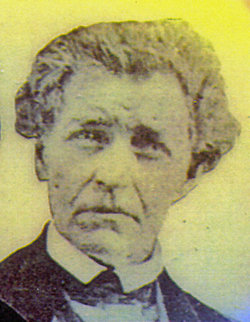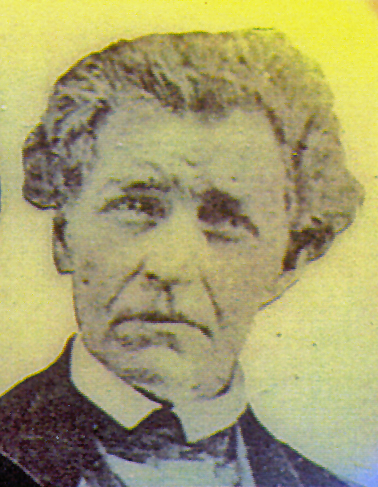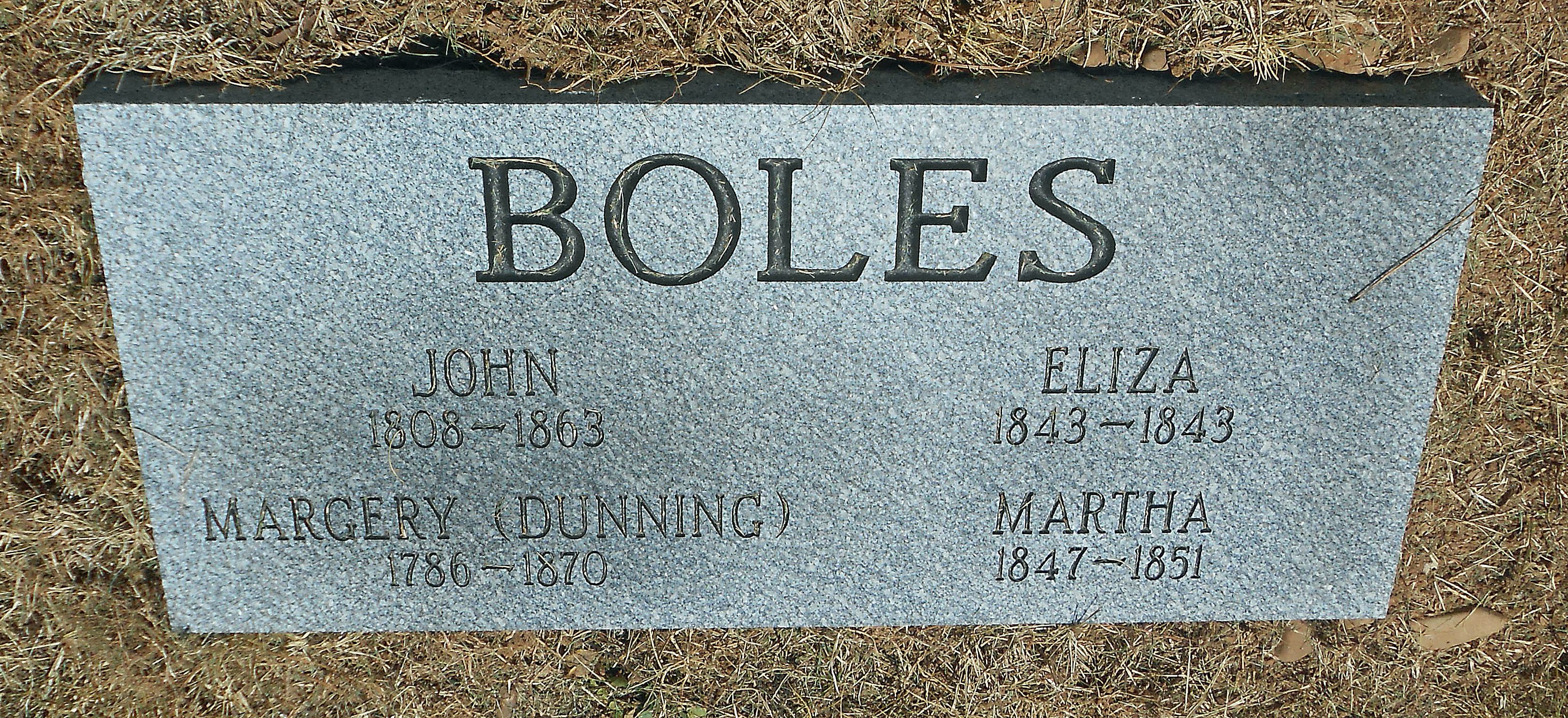August 4, 1898
~~~~~~~~
They came to the Territory of Arkansas in 1833. He from Humphreys and she from Dixon County, Tennessee. His Aunt Polly Dunning, had, in Tennessee, married her uncle Jesse May. Thus, while they (John and Mary) were of no blood kin, they had, by marriage, the same uncle and aunt.
Thomas Boles, father of John Boles, was born at or near Pittsburg, Pennsylvania, July 5th, 1776; his father being Charles Boles. It appears that he was Norman-Irish descent. In 1796, Thomas Boles, in company with the family of his then future wife, who was Margery Dunning, left Pittsburg, Penn. in keel-boats in which they floated down the Ohio River to the mouth of the Cumberland River, and then, by oars, poles and hooks, pulled and pushed themselves up that stream to where the town of Clarksville, Tennessee, now stands. When they landed there in 1796 there were only three or four white families in that neighborhood. They settled near there, where Thomas Boles and Margery Dunning were married. They established a home at what is now called Boles' Springs, in Humphreys County, Tenn., where they lived upon a farm and raised a large family; among them John Boles.
Thomas Boles, his father, died there Sept. 15th, 1848. The children all being grown and married, and there being no debts against the estate left by him it was amicably divided among the heirs, without an administration.
After this her son, John Boles, brought his widowed mother to his home at Bluffton, Yell County, Arkansas, where she made her home until her death at that place on Aug. 7th, 1870. She was a daughter of Robert Dunning, one of the earliest settlers of Clarksville, Tenn. and at one time owned a great part of the land upon which that town is built. She was born at Pittsburg, Penn., Feb. 11, 1786, and was about ten years old when her father moved from Pittsburg, Penn. to Clarksville, Tennessee, as already stated.
The writer obtained from her many of the facts above stated together with many others of interest, which unfortunately, he did not reduce to writing at that time. She was a woman of an exemplary and pious life; being a member of the Methodist Church. When the writer was a child she recited to him many incidents of the Indian Wars in Pennsylvania and Tennessee. She told him of seeing either Tecumsch or Red Jacket, but have forgotten which of them.
Mary (May) Boles, now Mary Gault is a daughter of Capt. Thomas May, who was of Scotch-English descent, and was born in Tennessee in 1794 and died at Knoxville, Johnson County, Ark., Feb. 24th, 1863. The town of Knoxville is built on a part of what was his plantation, upon which he settled in 1833. He was a son of Starling May, who was born in Anson Co., N.C.; moved to Tennessee in 1790, and thence to Johnson County, Arkansas about 1834, and settled at Cabin Creek, where he died and was buried. His father was William May, a soldier of the revolution, of Anson County, N.C., of which county he was sheriff.
John Boles and Mary May (she was sometimes called "Polly") had once seen each other in Tennessee, but had not become acquainted. When the two brothers, Capt. Thomas and Jesse May, came to Arkansas, the former brought his family by steam-boat, the latter came through by land with his family by wagons, bringing with him his live stock; and with him came the colored people and live stock of his brother, Capt. May. John Boles came with his uncle, Jesse May. Soon after their arrival in Arkansas he and Mary May became acquainted, and were married at her father's house on Dec. 10th, 1835, by a justice of the peace named Cazee.
They moved at once to their home on Little Piney, at one and one-half miles north-east of Cabin Creek, where they lived and farmed until February 1842; when they sold their home there to a step brother of hers, named Harvey Easley, and the farm is now (1898) called the "Easley Place", and is owned and resided upon by Van Rose, a distant relative.
After selling their home in Johnson County, he purchased in Yell County in Fourche La Fave valley, of a man named Frank Drennen, what is now known as the "Boles Homestead", near Bluffton; and they moved to it in February 1842. What he purchased from Drennen was a "claim". He afterward pruchased the land from the United States, and the State of Arkansas.
There they continued to farm, raising grains, grasses, fruits, vegetables, horses, cattle, mules, sheep and hogs, chickens, turkeys, geese, ducks and bees, but never raising a crop of cotton. By their intelligent industry they prospered, and were blessed with plenty, even to an abundance. They were hospitable, and were blessed with a host of friends; for all who knew them not only respected but loved them. They did, by their example, as pious and industrious people, a good work in advancing, improving and building up good society in their community and the surrounding country. Every enterprise that promised good for the public found in them hearty advocates and enthusiastic supporters with work and their means.
In these early days there were no Sunday Schools in that neighborhood; but they did not neglect the proper training of their children; for they procured Sunday School books, which each child was required to read and study as regularly as if there had been Sunday Schools; and impressions were then made that were deep, and as lasting as life. In the quietude of that humble forest home, lessons of piety , sound morality, honor and integrity, together with the love of God and humanity, was not neutralized by the mad rush for gain to satisfy insatiable greed. The Lord's Prayer and the Golden Rule then seemed to have been better understood and more observed than now. The faithful father and mother then strove to rear their children with strong bodies and clear heads, pure hearts and clean hands; in order that they might become worthy and useful citizens in this life and implant in them a hope of the best reward that may await the most favored of humanity after the close of our existence here.
There were born to them at their home on Little Piney, three children, and at the Boles' Homestead eleven. The following is a list of them together with their descendants so far as they have been obtained:
John Boles, son of Thomas Boles and his wife Margery Boles, nee Dunning, was born in Humphreys County Tennessee, May 19th, 1808.
Mary Boles, nee May, daughter of Thomas May and his wife Eliza May, nee Adams, was born in Dixon County, Tennessee, March 11, 1821.
It is hoped the re-union of August 4th, 1898, will be followed by many more by our posterity in future generations, and that this "Roster" of the Boles Family, of Bluffton, may be followed by others more complete, especially as to our ancestors. And may the annals of the Family ever remain free from the stain of crime or dishonor; and may they always show loving devotion to Family, Home and Heaven.
Thomas Boles,
Son of John and Mary Boles
Boles Family Reunion
Aug. 4th, 1898
Children of John & Mary Boles:
Judge Thomas Boles
... 1st wife: Julia Elizabeth Pound
... 2nd wife: Catherine Frances Keith
Malinda Boles
... 1st husband: Dr. Franklin Monroe Rounsaville
... 2nd husband: Thomas A. Hanks
William May Boles
... 1st wife: Mary Jane Parker
... 2nd wife: Mandana "Minnie" Snow
Eliza Boles
Catherine Boles
... husband: Robert Patrick Parks
Martha Boles
Judge Alfred H. Boles
... wife: Nannie Rubine Hurst
Mary Isabel "Shug" Boles
... husband: Thomas Jefferson Fowler
John James Boles
... wife: Mattie Varrena Nelson
Joseph Monroe Boles
Andrew Boles
Seth Boles, Sr.
... 1st wife: Mary Laflore
... 2nd wife: Mittie Patterson
... 3rd wife: Sam Gorden "Gordie" Albright
Viola May Boles
... husband: Thomas A. Johnston
Laura Elizabeth Boles
... husband: John Mathias Harkey
August 4, 1898
~~~~~~~~
They came to the Territory of Arkansas in 1833. He from Humphreys and she from Dixon County, Tennessee. His Aunt Polly Dunning, had, in Tennessee, married her uncle Jesse May. Thus, while they (John and Mary) were of no blood kin, they had, by marriage, the same uncle and aunt.
Thomas Boles, father of John Boles, was born at or near Pittsburg, Pennsylvania, July 5th, 1776; his father being Charles Boles. It appears that he was Norman-Irish descent. In 1796, Thomas Boles, in company with the family of his then future wife, who was Margery Dunning, left Pittsburg, Penn. in keel-boats in which they floated down the Ohio River to the mouth of the Cumberland River, and then, by oars, poles and hooks, pulled and pushed themselves up that stream to where the town of Clarksville, Tennessee, now stands. When they landed there in 1796 there were only three or four white families in that neighborhood. They settled near there, where Thomas Boles and Margery Dunning were married. They established a home at what is now called Boles' Springs, in Humphreys County, Tenn., where they lived upon a farm and raised a large family; among them John Boles.
Thomas Boles, his father, died there Sept. 15th, 1848. The children all being grown and married, and there being no debts against the estate left by him it was amicably divided among the heirs, without an administration.
After this her son, John Boles, brought his widowed mother to his home at Bluffton, Yell County, Arkansas, where she made her home until her death at that place on Aug. 7th, 1870. She was a daughter of Robert Dunning, one of the earliest settlers of Clarksville, Tenn. and at one time owned a great part of the land upon which that town is built. She was born at Pittsburg, Penn., Feb. 11, 1786, and was about ten years old when her father moved from Pittsburg, Penn. to Clarksville, Tennessee, as already stated.
The writer obtained from her many of the facts above stated together with many others of interest, which unfortunately, he did not reduce to writing at that time. She was a woman of an exemplary and pious life; being a member of the Methodist Church. When the writer was a child she recited to him many incidents of the Indian Wars in Pennsylvania and Tennessee. She told him of seeing either Tecumsch or Red Jacket, but have forgotten which of them.
Mary (May) Boles, now Mary Gault is a daughter of Capt. Thomas May, who was of Scotch-English descent, and was born in Tennessee in 1794 and died at Knoxville, Johnson County, Ark., Feb. 24th, 1863. The town of Knoxville is built on a part of what was his plantation, upon which he settled in 1833. He was a son of Starling May, who was born in Anson Co., N.C.; moved to Tennessee in 1790, and thence to Johnson County, Arkansas about 1834, and settled at Cabin Creek, where he died and was buried. His father was William May, a soldier of the revolution, of Anson County, N.C., of which county he was sheriff.
John Boles and Mary May (she was sometimes called "Polly") had once seen each other in Tennessee, but had not become acquainted. When the two brothers, Capt. Thomas and Jesse May, came to Arkansas, the former brought his family by steam-boat, the latter came through by land with his family by wagons, bringing with him his live stock; and with him came the colored people and live stock of his brother, Capt. May. John Boles came with his uncle, Jesse May. Soon after their arrival in Arkansas he and Mary May became acquainted, and were married at her father's house on Dec. 10th, 1835, by a justice of the peace named Cazee.
They moved at once to their home on Little Piney, at one and one-half miles north-east of Cabin Creek, where they lived and farmed until February 1842; when they sold their home there to a step brother of hers, named Harvey Easley, and the farm is now (1898) called the "Easley Place", and is owned and resided upon by Van Rose, a distant relative.
After selling their home in Johnson County, he purchased in Yell County in Fourche La Fave valley, of a man named Frank Drennen, what is now known as the "Boles Homestead", near Bluffton; and they moved to it in February 1842. What he purchased from Drennen was a "claim". He afterward pruchased the land from the United States, and the State of Arkansas.
There they continued to farm, raising grains, grasses, fruits, vegetables, horses, cattle, mules, sheep and hogs, chickens, turkeys, geese, ducks and bees, but never raising a crop of cotton. By their intelligent industry they prospered, and were blessed with plenty, even to an abundance. They were hospitable, and were blessed with a host of friends; for all who knew them not only respected but loved them. They did, by their example, as pious and industrious people, a good work in advancing, improving and building up good society in their community and the surrounding country. Every enterprise that promised good for the public found in them hearty advocates and enthusiastic supporters with work and their means.
In these early days there were no Sunday Schools in that neighborhood; but they did not neglect the proper training of their children; for they procured Sunday School books, which each child was required to read and study as regularly as if there had been Sunday Schools; and impressions were then made that were deep, and as lasting as life. In the quietude of that humble forest home, lessons of piety , sound morality, honor and integrity, together with the love of God and humanity, was not neutralized by the mad rush for gain to satisfy insatiable greed. The Lord's Prayer and the Golden Rule then seemed to have been better understood and more observed than now. The faithful father and mother then strove to rear their children with strong bodies and clear heads, pure hearts and clean hands; in order that they might become worthy and useful citizens in this life and implant in them a hope of the best reward that may await the most favored of humanity after the close of our existence here.
There were born to them at their home on Little Piney, three children, and at the Boles' Homestead eleven. The following is a list of them together with their descendants so far as they have been obtained:
John Boles, son of Thomas Boles and his wife Margery Boles, nee Dunning, was born in Humphreys County Tennessee, May 19th, 1808.
Mary Boles, nee May, daughter of Thomas May and his wife Eliza May, nee Adams, was born in Dixon County, Tennessee, March 11, 1821.
It is hoped the re-union of August 4th, 1898, will be followed by many more by our posterity in future generations, and that this "Roster" of the Boles Family, of Bluffton, may be followed by others more complete, especially as to our ancestors. And may the annals of the Family ever remain free from the stain of crime or dishonor; and may they always show loving devotion to Family, Home and Heaven.
Thomas Boles,
Son of John and Mary Boles
Boles Family Reunion
Aug. 4th, 1898
Children of John & Mary Boles:
Judge Thomas Boles
... 1st wife: Julia Elizabeth Pound
... 2nd wife: Catherine Frances Keith
Malinda Boles
... 1st husband: Dr. Franklin Monroe Rounsaville
... 2nd husband: Thomas A. Hanks
William May Boles
... 1st wife: Mary Jane Parker
... 2nd wife: Mandana "Minnie" Snow
Eliza Boles
Catherine Boles
... husband: Robert Patrick Parks
Martha Boles
Judge Alfred H. Boles
... wife: Nannie Rubine Hurst
Mary Isabel "Shug" Boles
... husband: Thomas Jefferson Fowler
John James Boles
... wife: Mattie Varrena Nelson
Joseph Monroe Boles
Andrew Boles
Seth Boles, Sr.
... 1st wife: Mary Laflore
... 2nd wife: Mittie Patterson
... 3rd wife: Sam Gorden "Gordie" Albright
Viola May Boles
... husband: Thomas A. Johnston
Laura Elizabeth Boles
... husband: John Mathias Harkey
Bio by: Mary Fowler Leek
Family Members
-
![]()
Thomas Boles
1837–1905
-
![]()
Malinda Boles Rounsaville
1839–1874
-
![]()
William May Boles
1841–1926
-
![]()
Eliza Boles
1843–1843
-
![]()
Catherine Boles Parks
1845–1876
-
![]()
Martha Boles
1847–1851
-
![]()
Judge Alfred H. Boles
1849–1943
-
![]()
Mary Isabel "Shug" Boles Fowler
1850–1928
-
![]()
John James Boles Jr
1852–1939
-
Andrew Boles
1855–1864
-
![]()
Seth Boles Sr
1858–1951
-
![]()
Viola May Boles Johnston
1860–1933
-
![]()
Laura Elizabeth Boles Herrington
1861–1911


















